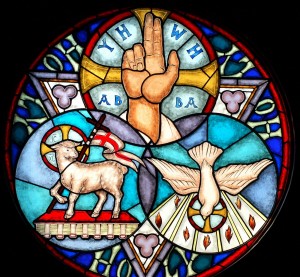 Q. This Sunday is the Solemnity of the Most Holy Trinity, and we Catholics are used to hearing about God the Father, God the Son, and God the Holy Spirit. But some Australian priests got a bit “creative” with the liturgy a few years ago, and began opening the Mass in a different way. Instead of saying, “In the name of the Father, and of the Son, and of the Holy Spirit”, they said this: “In the name of the Creator, the Redeemer, and the Sanctifier”. They were severely reprimanded by their bishop. Why was this such a big deal to the Church?
Q. This Sunday is the Solemnity of the Most Holy Trinity, and we Catholics are used to hearing about God the Father, God the Son, and God the Holy Spirit. But some Australian priests got a bit “creative” with the liturgy a few years ago, and began opening the Mass in a different way. Instead of saying, “In the name of the Father, and of the Son, and of the Holy Spirit”, they said this: “In the name of the Creator, the Redeemer, and the Sanctifier”. They were severely reprimanded by their bishop. Why was this such a big deal to the Church?
A. What these priests did was wrong on many levels. The biggest problem was that creating, redeeming and sanctifying are things that God does, but they are not who he is. Yes, it is true that God created the cosmos, and that Jesus redeemed us, and that the Holy Spirit sanctifies us (makes us holy, provided we cooperate with God’s grace). But creating, redeeming, and sanctifying are God’s activities, not his identity. He is Father, Son, and Holy Spirit (cf. Matthew 28:19).
Q. Why did God not reveal himself as a Trinity of Persons until the age of the New Covenant, in which we are now living?
A. God dealt with humanity as a wise parent deals with a child. This has often been called the “divine pedagogy”. A small child cannot understand trigonometry or quantum physics. One must start with simple concepts, like “2 + 2 = 4”, and build from there. More truth is added when the student is ready to handle it. In the same fashion, God gradually revealed truth about himself to human beings, culminating in the revelation of the Most Holy Trinity.
I actually think that the Trinity is all over the Old Testament as well – God creating the universe by his powerful “Word” in Genesis – the Word that later became flesh, Jesus Christ (John 1:14). God’s Spirit hovered over the waters of creation – the Holy Spirit (Genesis 1:2). God said, “Let us make man in our image” (Genesis 1:26). All of this is less explicit than we might like it to be, but the doctrine is there. I believe that one reason God did not more clearly spell out the doctrine of the Trinity until later in salvation history was the problem of polytheism in the ancient Near East.
In the Old Testament period, God chose to reveal himself to the world gradually through the agency of his people, Israel. The ultimate plan was for all the nations (or “Gentiles”, ethnic groups) outside of Israel to join God’s family. This was promised to Abraham, the father of the Jewish people, when God promised him that all the nations of the earth would be blessed through his “seed” (Genesis 22:18). This finally happened in the age of the universal (the word “Catholic” means “universal”) Church of Jesus Christ, the son (descendant, or “seed”) of Abraham, according to the flesh (Matthew 1:1).
But, in the time of ancient Israel, God’s people lived among many other peoples who were polytheists (they believed in many “gods”). At that time, it was more important for Israel to reveal to the world that there is only one true God. The revelation that there are three persons in the one God would have to wait. If that truth had been fully proclaimed at that point, it may have confused non-Jews, who may have viewed the Trinity as three different “gods”, rather than three Divine Persons sharing one Divine nature.

